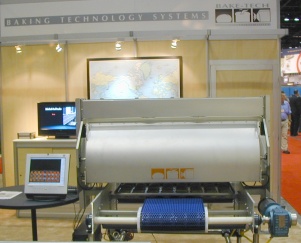The Georgia Tech Research Institute (GTRI) may possess the secret to baking perfect buns every time. Its researchers have developed a production-line system that automatically inspects the quality of sandwich buns exiting the oven and adjusts oven temperatures if it detects unacceptable buns.
“We have closed the loop between the quality inspection of buns and the oven controls to meet the specifications required by food service and fast food customers,” said GTRI senior research engineer Douglas Britton. “By creating a more accurate, uniform and faster assessment process, we are able to minimize waste and lost product.”
During existing inspection processes, workers remove a sample of buns each hour to inspect their color. Based on this assessment, they manually adjust the oven temperature if the buns appear too light or too dark. But with more than 1,000 buns leaving a bakery production line every minute, there is a great need for automated control to make more rapid corrections to produce buns of consistent color, size, shape and seed coverage.

GTRI has developed a production-line system that automatically inspects the quality of sandwich buns exiting the oven and adjusts oven temperatures if it detects unacceptable buns. Image credit: GTRI
“Automated control over the baking process is necessary to produce a consistent product through batch changes, shift changes, daily and seasonal temperature and humidity changes, and variations in ingredients,” added Britton.
Working with baking company Flowers Foods, headquartered in Thomasville, Ga., and Baking Technology Systems (BakeTech), a baking equipment manufacturer in Tucker, Ga., Britton and GTRI research scientist Colin Usher have tested their industrial-quality prototype system. Made of stainless steel, the system is dust and water resistant, and mounts to existing conveyor belts as wide as 50 inches.
The prototype system has been shown at the International Baking Industry Exposition held in Las Vegas. Initial funding for this project was provided by Georgia’s Traditional Industries Program for Food Processing, which is managed through the Food Processing Advisory Council (FoodPAC).
Britton and Usher tested the system in a Flowers Foods bakery for a year, running it regularly for hour-long intervals. During this testing phase, the system successfully inspected a variety of buns, including seeded buns, unseeded buns, different size buns and different top-bun shapes. For the past year, the system has been in full-operational mode in the bakery.

GTRI worked with Georgia companies Flowers Foods and Baking Technology Systems (BakeTech) to design a prototype imaging system to inspect the quality of sandwich buns. It has been in full-operational mode in a baking facility for more than a year. Image credit: GTRI
“Without the imaging system, it would be impossible for an operator to respond quickly enough to make the correct changes to the oven to improve the target color of the product,” said Stephen Smith, BakeTech’s vice president and director of engineering.
As fresh-baked buns move along Flowers’ production line, a digital camera captures an image of them. Items not measuring up in terms of color are identified by imaging software and the color information is automatically sent to the oven controllers, which adjust the oven temperature to correct the issue.
“Our system reduces the time between noticing a problem and fixing it,” Usher explained. “The window for correction is short, though, because an entire batch may only take 12 minutes to bake and the buns stay in the oven for eight minutes, providing a four-minute window to correct the temperature of the batch once the first buns come out so that the rest of the buns in the batch are an acceptable color when they come out of the oven.”
The system also automatically records data including shape, seed distribution, size and contamination to generate production reports that are immediately available for statistical process control. Another feature of the system is that the conveyor belt can be any color except the color of the buns. This allows the system to image buns on almost any conveyor belt surface or in pans.
In the future, the imaging system could be adapted to control the quality of other bakery products, such as biscuits, cookies, crackers, bread and pies.
*Source: Georgia Tech Research Institute (GTRI)
